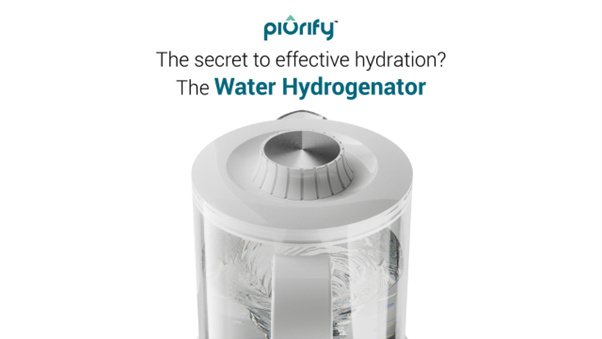Water is undoubtedly one of the most essential substances on Earth, vital for all forms of life. We consume it daily, use it for various purposes, and even rely on it for our survival.

But what if there was a way to transform this common molecule into something extraordinary? Come into the world of ionized water, which has become more famous recently because it might be good for your health and has some interesting qualities.
We will look into the science behind ionized water in this piece, learning about its interesting secrets and judging how it might affect our health.
The Basics of Ionized Water
Ionized water, often referred to as alkaline water or electrolyzed water, is water that has undergone a process known as ionization or electrolysis. This process involves using a water ionizer pitcher machine to split the water into two lines, one that is acidic and one that is alkaline.
This separation is achieved by passing an electric current through the water, which ionizes the water molecules, resulting in the creation of negatively charged ions (hydroxide ions) and positively charged ions (hydronium ions).
The alkaline water produced through this process typically has a pH level greater than 7, making it more basic than regular tap water, which usually has a neutral pH of 7. On the other hand, the acidic water has a pH level lower than 7.
People who support ionized water say that drinking alkaline water is good for you in many ways, while acidic water can be used to clean and germ-kill.
Read Also:
The pH Factor
The pH level is one of the most important things about energized water. A substance’s pH level tells you how acidic or basic it is. Values range from 0 (very acidic) to 14 (very basic). Things that are neutral, like water, have a pH of 7.
With more alkalinity, ionized water usually has a pH level between 8 and 10, but this depends on how it was ionized and what pH level is wanted.
Advocates of ionized water often claim that maintaining an alkaline pH in the body is beneficial for health. They argue that an overly acidic environment within the body can lead to various health issues, including inflammation, fatigue, and even chronic diseases.
Ionized water is promoted as a means to help counteract this acidity and restore balance.
However, it’s important to note that the human body is highly effective at regulating its pH levels, and the impact of dietary or water intake on body pH is limited and temporary. The body’s natural buffering systems ensure that deviations from the optimal pH range are swiftly corrected.
So, while ionized water may temporarily raise the pH of your stomach contents or urine, its long-term impact on overall body pH is questionable.
Antioxidant Potential
Ionized water may also have protective qualities, which is another benefit that has been talked about. Free radicals are chemicals that are bad for the body and have been linked to many diseases and getting older.
Antioxidants can fight these free radicals. It is said that the negatively charged hydroxide ions in ionized water can act as an antioxidants.
Some people say that drinking alkaline water can help fight oxidative stress and make you less likely to get heart disease, cancer, and other illnesses that are linked to free radical damage. Energized water indeed has more hydroxide ions than regular water, but it is not clear that this makes it a better antioxidant.
The body already has ways to protect itself from antioxidants, and drinking ionized water by itself probably won’t make a big difference. To help your body’s natural defense against free radicals, eat a healthy diet full of fruits, veggies, and other foods that are high in antioxidants.
Hydration and Microclustering
One of the intriguing claims made by proponents of ionized water is that it can enhance hydration due to smaller water clusters.
Water molecules typically form clusters due to hydrogen bonding. These clusters can vary in size, and some advocates argue that ionized water produces smaller water clusters, making it easier for the body to absorb and hydrate.
The theory behind this claim is that smaller water clusters can penetrate cell membranes more effectively, improving cellular hydration.
However, the scientific evidence supporting this idea is limited. While some studies suggest that ionized water may have a slightly different structure than regular water, the impact on hydration remains uncertain.
In reality, the body is highly efficient at regulating its water balance, and the size of water clusters is not a primary determinant of hydration. Factors such as overall water intake, electrolyte balance, and individual physiology play more significant roles in maintaining proper hydration.
Potential Health Benefits and Controversies
Advocates of ionized water suggest a wide range of potential health benefits, including:
Improved hydration: As discussed earlier, some claim that ionized water’s smaller water clusters enhance hydration. However, scientific evidence supporting this idea is inconclusive.
Antioxidant effects: The presence of hydroxide ions in ionized water may offer some antioxidant potential, but the impact on overall health remains uncertain.
Alkalizing effects: Ionized water can help raise the pH of the body temporarily, but its long-term effects on health are not well-established.
Detoxification: Proponents argue that ionized water can help the body detoxify by removing acidic waste products. However, the body already has mechanisms, such as the kidneys and liver, for detoxification.
Improved energy levels: Some users claim increased energy and reduced fatigue after drinking ionized water, but these effects may be subjective and not universally experienced.
Some people say that moving to ionized water makes their health better, but many of these benefits are not backed up by strong scientific proof. Ionized water can have a lot of different effects on health, which means that they may be different for each person.
Some people also say that energized water is usually expensive and might not be much better than normal, clean drinking water. It’s important to be skeptical of promises that something will help your health and to get personalized advice from health experts.
Potential Risks and Concerns
Ionized water is usually thought to be safe to drink, but there are a few things you should know about the risks:
Altered taste: Some individuals find the taste of ionized water unpleasant due to its alkaline nature.
Expense: Ionizers can be costly, and ongoing maintenance, including replacement filters, can add to the expense.
Environmental impact: The production and disposal of ionizer machines and replacement filters may have negative environmental consequences.
Lack of regulation: Ionized water is not subject to the same regulations as tap water, which undergoes rigorous testing for safety and quality.
Deceptive marketing: Some companies may make exaggerated or unsupported claims about the health benefits of ionized water.
It’s best to use electrified water in moderation and think about the risks and costs that might come with it. Additionally, talk to a medical worker before making big changes to how much water you drink, especially if you already have a health problem.
Conclusion
Ionized water, with its altered pH, potential antioxidant properties, and claims of various health benefits, has generated significant interest and controversy in recent years.
While some users report positive experiences with ionized water, the scientific evidence supporting many of these claims remains limited and inconclusive.
You should carefully think about the pros and cons of ionized water before deciding to add it to your daily routine. You should also talk to health professionals about your choice.
Maintaining a healthy and varied diet, drinking enough clean water, and sticking to tried-and-true health-supporting habits are all important.
More studies may help us understand how electrified water might affect health and well-being as the science of it grows. A good way to stay healthy until then is to keep an open mind, think critically, and focus on methods that have been shown to work.









